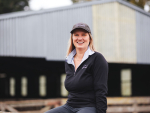Restrictions come off European milk production in 16 months and the Irish are chomping at the bit to sieze the opportunity to “unleash their dairy industry on the world,” says Proudfoot.
Irish dairy co-op Dairygold is investing $260 million in Irish processing facilities to massively increase operations when EU restrictions on milk production end in April 2015. A new factory in Cork will have two dryers, and a new dryer will be commissioned in an existing Cork factory. They may be small by our standards, but to dismiss them out of hand would be dangerous and unfortunate.
The EU milk market is regulated by a quota system. Every member state has a national production quota which it distributes to farmers. Whenever a member state exceeds its quota, it has to pay a penalty (called ‘super levy’) to the EU. This national penalty is in turn financed by penalties imposed on farmers who have exceeded their individual limits.
The EU decided in the 2009 ‘Health Check’ reform that national quotas will be increased 1% every year, so that their value is slowly eroded, preparing for a soft landing in 2015.
New Zealand has had captive markets in world dairy trade for many years and there are signs it has taken these for granted. The botulism scare, problems with dairy factories and the general failure of Fonterra to force its farmer shareholders quickly up to speed on sustainability are examples of complacency. Fonterra seems unwilling to take a hard line by kicking out of the dairy industry those farmers who ignore the rules on sustainability. More action and less talk might do the trick.
The Irish have ‘Origin Green’ and will use this to great effect when they start marketing in Asia. European farmers have played hardball with New Zealand in the past and there is no reason to doubt they won’t do it again.
New Zealand’s reputation has been sullied by the false botulism scare and other transgressions and this is opening the door for others, like the Irish, to snatch market share from us. Some of the independent dairy companies here, such as Westland and Miraka, have shown they can make a dent in Fonterra’s position.
It is critical that, as suggested by chief executive Theo Speirings, Fonterra lifts its game considerably. Kicking a few feral dairy farmers off their books could be a starting point.








